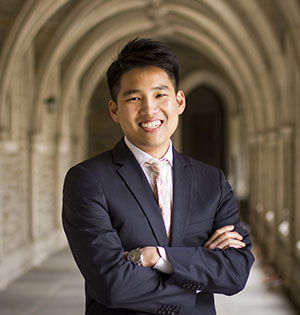Andrew Kim, 26, East Asian Studies
When Andrew Kim was an undergraduate at Princeton, he spent a year abroad in China. During that time, he met a Chinese citizen of Korean ethnicity. “It had never occurred to me,” he says, “that there were people of Korean ancestry in China who saw themselves just as Chinese as I saw myself as American.” The experience made him appreciate his American identity and Asian heritage in a new light.
When he got back from Asia, Kim dedicated his college studies, and then his career, to improving Asian-American relations. “I’m motivated by my love for this country,” he says, “my faith in U.S. leadership, and my belief that the United States’ relationship with the Asia-Pacific will largely determine the course of this century.”
Originally from Roslyn, New York, Kim is a first-generation American. His father, orphaned as a young child, grew up in poverty in Seoul just after the Korean War. In his twenties, the elder Kim immigrated to pursue the American dream and succeeded in being able to provide his son with opportunity and abundance.
(Photo: Andrew Kim)

“My father and I grew up in two wildly different environments,” Kim says. “To this day, we understand very little about each other’s worlds. He’s terrible at giving me career advice, but I have never admired anyone more than him. No one has ever been a more moving example to me of what it means to be a loving person, to always make the best of what you’ve been dealt, and to lead a life of service.”
The service Kim hopes to provide is to represent the U.S. abroad, and to help ensure peace and prosperity in Asia. “No one person can touch all aspects of this monumental challenge,” he says, “but the specific pieces that I think about most are managing sudden changes on the Korean Peninsula; ensuring that democracy plants deep, lasting roots into Burmese society; and building greater trust between the U.S. and China.”
During his freshman year at Princeton, Kim enrolled in Chinese 101 and fell in love with the language, leading him to spend that year abroad. Living in China triggered a fascination with that country’s national identity and foreign policies.
Kim interned in the U.S. Department of Defense’s Office of East Asian Affairs and had a fellowship in the Department of State’s Bureau of East Asian and Pacific Affairs, where he served as special assistant to the envoy for North Korea. He has also assisted the ambassador at the U.S. Embassy in Yangon, Burma. Throughout that time, he briefed very senior-level U.S .officials.
His supervisor at the state department considers Kim to be one of the best young diplomats she’s ever worked with. “Andrew not only did the work of a full-fledged foreign service officer,” she says, “he took on the hardest jobs in the most sensitive policy areas and turned in outstanding products in short order.”
“During my time at the State Department,” Kim says, “I learned that much of diplomacy is learning to see the world from the other side of the table.”
Back at Princeton, he won the Woodrow Wilson School Thesis Prize for his research about South Korea’s national identity. He received several other awards for academic excellence, co-founded the Asian American Studies Program Task Force, and was vice president of the Korean American Students Association. He graduated summa cum laude, Phi Beta Kappa.
During his free time, Kim experiments with cooking Korean food in ways that appeal to the American palate (“There’s a cookbook idea here but I can’t spill any secrets just yet.”) and acts in modern Chinese theater. “Becoming someone else on stage is a profoundly immersive experience,” he says, “and doing it in Chinese has stretched my understanding of China in many unexpected directions.”
Eventually Kim returned to Princeton to get his master’s in public affairs. After he graduates again this summer, he wants to keep representing the U.S. government in Burma and doing other conciliatory work between Asian countries and the U.S.
“My core passion,” he says, “is in shaping the way Asians see Americans, and deepening the bonds that unite us across the Pacific.”
See our complete 2014 list of the 30 top thinkers under 30 here.





